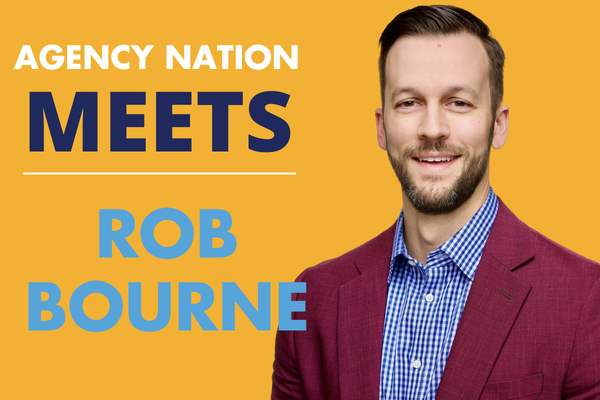InsurTech Insights Conference: AI Meets IAs

By: Dave Evans
At last week’s 2024 Insurtech Insights conference in New York City, more than 5,000 attendees representing every facet of the insurance industry came together to present, demonstrate and discuss the most recent innovations. This year’s conference focused on generative artificial intelligence (AI) and the industry’s accelerated acceptance of AI to extract data to deliver better outcomes in underwriting, claims, service and sales.
The arrival of ChatGPT in late 2022 meant that generative AI could be harnessed by companies to automate administrative tasks, assist with creative ideas and code software. At Insurtech Insights, it was evident from the panels and presenters that the insurance industry is indeed embracing AI.
In the opening general session, Casey Kempton, president of personal lines for Nationwide, discussed how technology is being applied to better adjudicate claims and to provide agents with tools to serve clients.
However, Kempton noted that consumers can be distrustful, pointing out the use of drones to inspect roofs and telematics to illustrate how some people feel this technology is an intrusion on their privacy. “Agents can help in dispelling those notions by educating their customers to the benefits gained … speed, accuracy and lowering the cost of insurance,” she added.
Another session, “Brokers and Carriers in the Digital Age,” highlighted the potential uses of technology within existing realities. An overriding theme that both carriers and managing general agents (MGAs) face is “whether to build or buy” stated Eric Ayala, managing director of the Americas at Novidea. This issue dovetails with the challenge carriers face with consolidating legacy systems, an issue that independent agents are well aware of as carriers grapple to upgrade their systems seamlessly.
Josh Curry, executive vice president at BMS Re, pointed out that the buyer personas that can be gleaned from data will increasingly inform the approach of the agent. He also indicated that automation is being adopted in the small commercial insurance space, which will aid the distribution of those products. Curry mentioned that an opportunity for synergy can be gained by using AI to match the customer’s needs with the appetite of the carrier.
The session that followed, “Carriers and Agents: Stronger Alliances through Digital Innovation,” continued the theme of harnessing technology to better serve the agent and customer. Sivan Iram, co-founder and CEO of Flow, said that the starting point should be the question: “What is the pain point that you are trying to solve?”
The answer should drive how to employ technology to get the job done. “An important consideration is recognizing what needs to be changed and what doesn’t need to be,” Iram added, discussing how agents tend to hate portals due to the need for multiple passwords and, as a result, agents still prefer conducting business over email.
Jack Ramsey, vice president, agent channel, at Next Insurance, commented during the session that he believes the smaller the commercial policy premium, the more customers need to be able to generate instant quotes because the operating margins are too slim for agents to expend time on servicing tasks. He used the example of permitting customers to generate certificates of insurance as an efficient use of technology that aids the agent.
Adam Chadroff, principal at Equal Ventures, opined that while at first agents were fearful of digital innovation, they are now not only embracing it but also asking for it. Agents are now more focused not just on the service aspect but their entire customer experience journey—from initial contact to quoting, binding, onboarding, and facilitating customer self-service.
An overarching theme throughout the conference was that the customer experience in the insurance industry has historically lagged behind other industries. Now, with the ever-increasing capabilities of large language models (LLMs), the gap is closing. This advancement is not just reserved for the largest carriers and brokers, as evidenced by Jimmy Padia, founder of Floatbot, during his presentation on how AI is breaking new ground to help carriers and agents.
Padia highlighted how AI-powered chatbots and voicebots assist with claims submissions, starting with the first notice of loss. Customers call to report a claim 95% of the time, he shared. Using Floatbot’s 24/7 “digital adjuster,” the call is answered by tapping into the carrier’s data so the AI voicebot can have a meaningful conversation with the insured. Remarkedly, the conversation is not stilted. The result is that the adjuster’s time involvement is reduced by an average of 25%.
It’s important to note that AI agents perform sentiment analysis to gauge whether the customer is feeling satisfied with the interaction. Since Floatbot employs a “human-in-the-loop” approach and a person can jump into the call if needed.
AI-powered voicebots can also serve the role of a customer service representative for insurance agencies. During Padia’s demonstration, he used the example of a customer calling the agency because they are purchasing a car. “Lexi” the AI agent can tap into the customer’s policy data so that coverage can be added. The example customer did not know how to access the vehicle identification number (VIN), and Lexi provided four ways for the consumer to locate it. The conversation sounded very much like a human interaction.
The takeaway from this year’s Insurtech Insights conference is that innovation is coming fast, creating efficiencies throughout the entire insurance ecosystem and independent agents can harness it all.
Next year’s Insurtech Insights conference is June 4-5, 2025, in New York City. It will provide a telling window into how industry stakeholders are adapting technology—and AI in particular—to produce efficiencies that could not be conceived of just a few years ago.
Independent Agent magazine readers can use discount code BIGI30 to receive 30% off next year’s event. Early-bird registration is now open.
Dave Evans is a senior associate with insurance marketing firm Aartrijk, based in Fairfax, Virginia.










